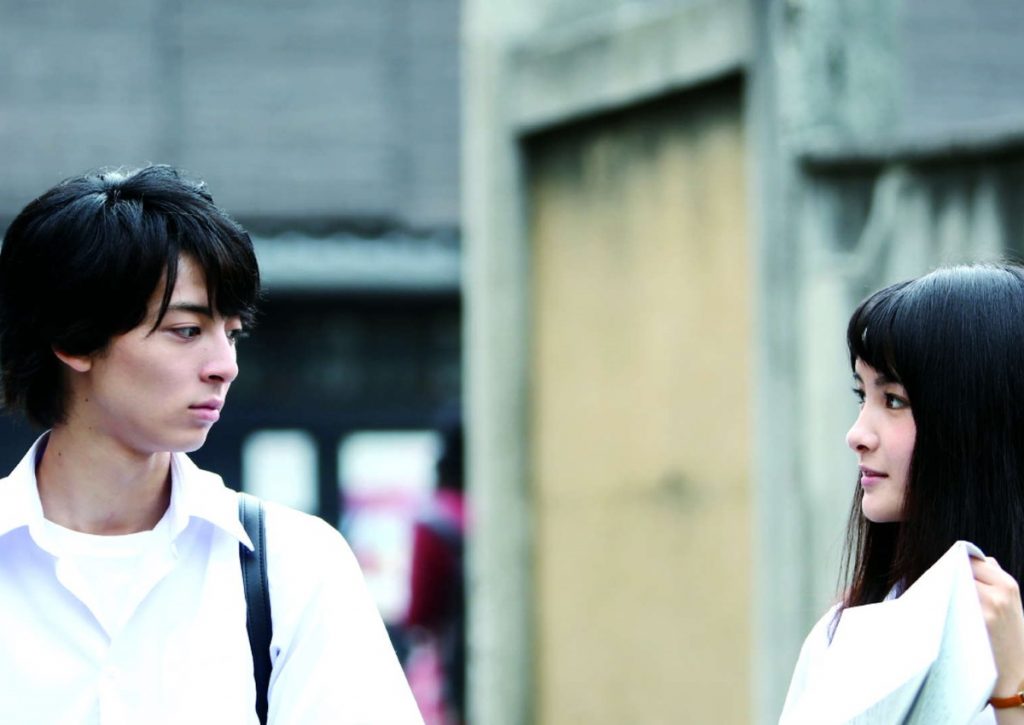Japan and their indie movies. It’ll always be an interesting combination, and a thing I’ll gladly accept more of any day. Gyakko no Koro, also known as The Time of Backlights, isn’t any different and as soon as it starts off you get the vibe. It’s calm, it’s slow. You already know nothing much will happen, but you’re not expecting it either. It’s simply not needed. It’s just a matter of getting on for the ride or not.
Takasugi Mahiro plays lead boy Akata Takatoyo. Having grown up and still living in Kyoto as he attends high school, his life passes by calmly and without apparently any big issue. From meeting with his childhood friend and crush Tachibana Mikoto, to troublemaker Kojima, and a classmate with a big dream, Kohei. From lazy mornings where he lays staring at a window to belatedly realize he’ll be late for class or whatever appointment he has, to falling asleep at school and not waking up till late at night. His seemingly wandering mind pulls him from place to place, losing concentration when something that passes him looks more interesting than what he intended to do.
The rocker with big dreams
It’s at one of these moments Akata’s morning rush is interrupted as he passes Kohei (played by Shimizu Hiroya). As the vocalist/guitarist of a band he skips class to perform at what feels like a very early-in-the-day gig at a local bar. Akata eventually follows him on a whim, leaving class for what it is, yet is noticeably a bit out of place among the many different types of people gathered to watch the band play. When the gig comes to an end, Kohei takes his classmate along for drinks and food, passing time as they sit at the riverbank. It’s then Kohei’s laidback personality comes out as he near dives into the river, and his energy prompting Akata to join him. It seems that Kohei’s existence gives him excitement he doesn’t have in his own, so when the rocker-at-heart quits school and leaves the city to go and chase his dreams in Tokyo, Akata is left behind with a little emptiness.
It’s safe to say that Shimizu Hiroya was a pretty good choice for the free-spirited Kohei. Hiroya’s appearance shows again how different he can feel depending on the role he’s playing, and while I can usually explain why or how I haven’t yet figured out what his secret is. For a kid his age – he’s just 18 after all – he still has lots of time to work on stuff and grow, but if he’s already pulling the attention towards himself for just being there a few minutes, raising questions while he’s at it, then I’d say he’s off to a great start.
The childhood friend and the troublemaker
Next is Tachibana Mikoto (Aoi Wakana), Akata’s childhood friend and love interest. The girl seems to know her friend very well, always knowing what to say to him as well as finding him everywhere wherever he’s ended up. Even if that means having to walk around school at night to come and get him. While usually these childhood friend – yet love interest – couples are written to feel awkward around each other there’s no such thing in Gyakko no Koro, so when Kojima (Kaneko Daichi) comes to bother them Mikoto is quick to tell Akata she’s annoyed.
Both Aoi Wakana, and Amuse rookie Kaneko Daichi play their roles as expected, fitting the little characterizations we get to see. While there’s not much to say on the acting of the former, she does come around in a variety of scenes, showing her bond with Akata. The latter, Kaneko, only gets the focus two times. Both times, however, he firmly gets his point of existence in the story across. Though a fairly new name on the scene, Kaneko delivers his character with a flair that almost makes me believe he’s used to it. Then again, looking at the roles he’s been playing it’s definitely not the first and it won’t be the last type of brat he’ll get cast as. Maybe he was just born with the right type of eyes and stare. Or maybe it’s in his genes. We’ll have to wait and see.
Star of the show
Last but not least there’s the main star of the 66 min movie, Takasugi Mahiro. The now 21-year-old had his first acting experience in a stage play but quickly moved to the screen, meaning his list of participations and roles is a lot longer than you’d expect it to be. But there’s definitely reason to that. In 2017 and 2018 alike Mahiro grabs the attention, the castings, and at the same time doesn’t let himself be stuck in a corner of a genre. He is everywhere if only you open your eyes enough to notice. Gyakko no Koro brings him closest to a type of character I easily link with him. Calm, easygoing, very mypace, yet also some naivety and impulsive behavior present. And as usual he delivers again and again, convincing me he’ll continue to find new ways to show he’s not just a random pretty face who got his name out through a few well-cast projects.
Bottomline, Gyakko no Koro is a pleasant indie release that shows simple can be nice. The LA adaptation of a oneshot manga of the same name gathers a solid cast of young actors making me anticipate their future endeavors, and leaves me with a feeling of wanting more. I guess with all the castings they’ve been involved in lately at least I won’t have to worry about that.

